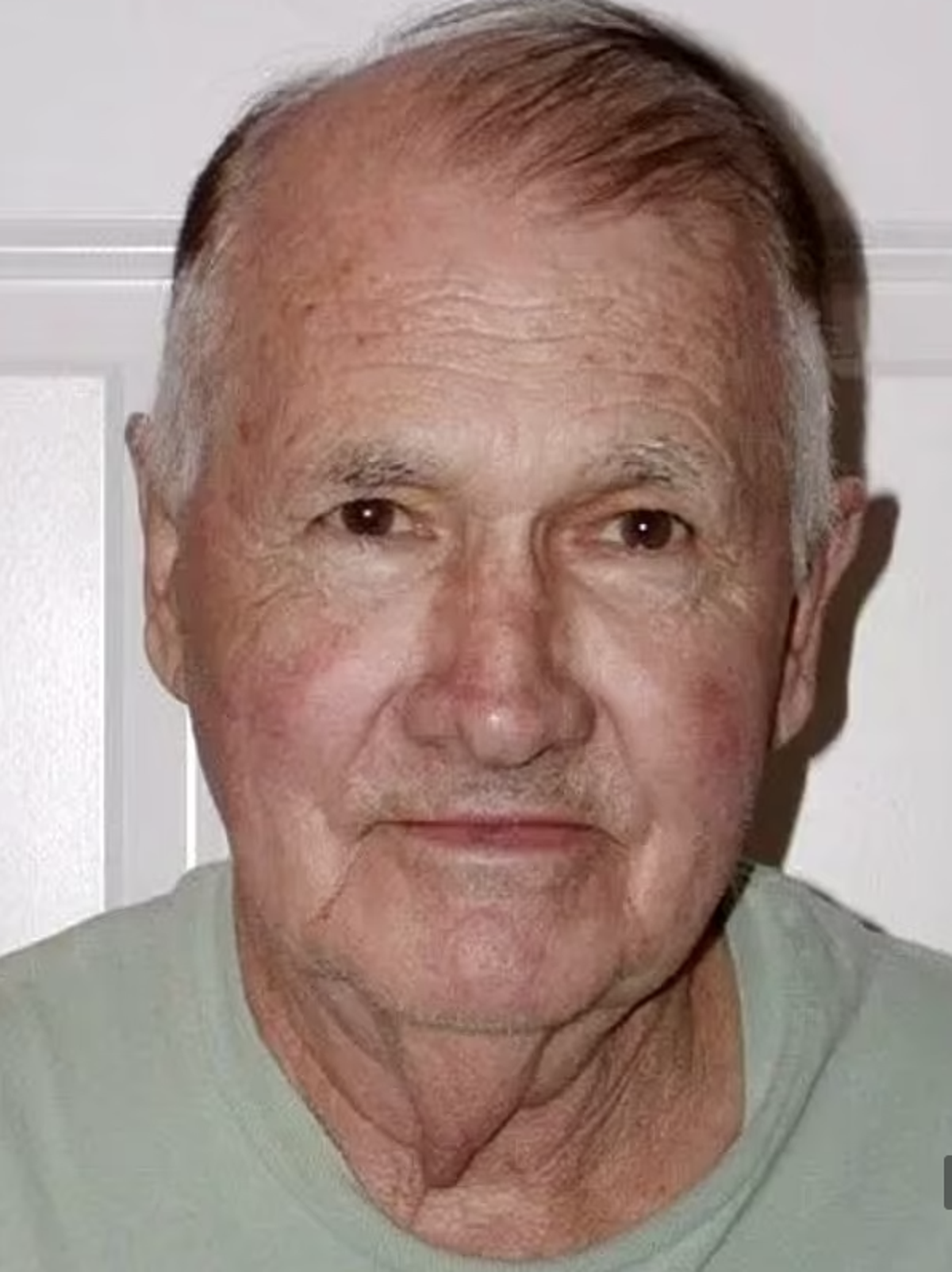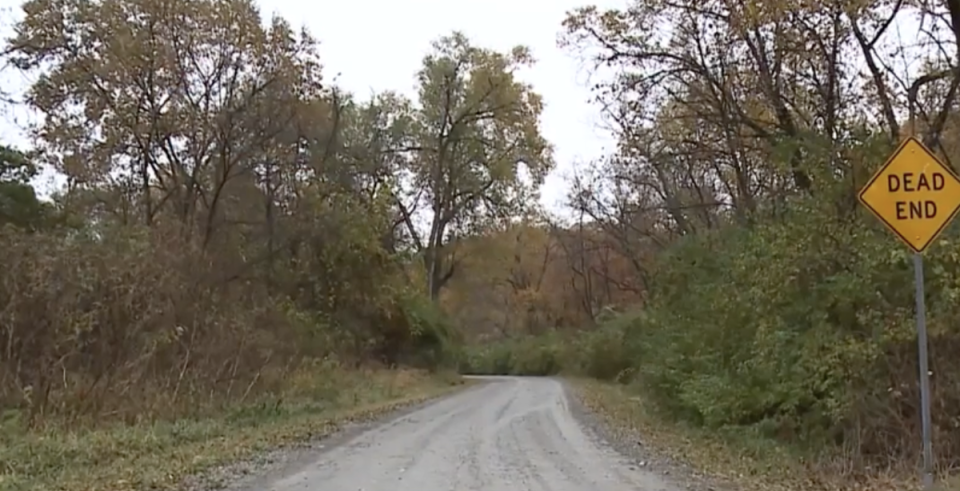An Iowa woman claims her father was a serial killer who hid up to 70 victims in his yard. Her sister says that’s a lie

When Lucy Studey remembers her father, she thinks of the bodies she claims she saw him bury.
There are no fond memories of him reading her tales before bed, or pushing her on the swings. Instead, the 53-year-old says the memory of her father that was painfully carved in her mind is of him forcing her and her siblings to bury the remains of 50 to 70 women on their property west of Tabor, Iowa.
The allegations Lucy has raised against her father, Donald Dean Studey, had fallen on deaf ears for 45 years, she says, until earlier this year she filled in Fremont County Sheriff Kevin Aistrope on the secret she claims she’s carried since she was a little girl.
“He would just tell us we had to go to the well, and I knew what that meant,” Lucy told Newsweek in an exclusive interview. “Every time I went to the well or into the hills, I didn’t think I was coming down. I thought he would kill me because I wouldn’t keep my mouth shut.”
Her sister, Susan Studey, has very different memories. Susan has vehemently refuted Lucy’s claims, telling Newsweek that their father was strict, but he was not a serial killer.
“Strict fathers don’t just turn into serial killers... I’m two years older than Lucy. I think I would know if my father murdered,” Susan told Newsweek. “I would know if my dad was a serial killer. He was not, and I want my father’s name restored.”
An FBI investigation was launched following Lucy’s claims, and the sheriff’s office sent cadaver dogs to the well where the bodies were reportedly buried. Two dogs picked up hits in areas near the well, and although no remains have been recovered yet, Mr Aistrope said that he is inclined to believe Lucy.
Donald Studey died in 2013 at the age of 75, and although Lucy says she cannot bring justice to the families who are still wondering what happened to their loved ones, she is determined to at least give them closure.
Here’s what we know about the case so far:
The ‘dark-haired and young’ alleged victims
According to Lucy’s account to Newsweek, the murders took place in the 1980s. The victims her father allegedly chose were white, in their 20s or 30s and had dark hair.
She also told the outlet that some of them had dirty blonde or red hair, tightly cropped.
They were sex workers or transients that Donald Studey would pick up from Omaha, Nebraska, and take to his farmland. Only one of them, Lucy says, was a 15-year-old runaway.
Donald Studey would smash their heads violently inside the trailer where he lived with the family, Lucy claimed, or stab and shoot them.
The female victims were then allegedly thrown into the 100-foot well, with their clothes and jewellery on.
Justifying the killings before his children, he once said, “the b**** deserved it,” Lucy told Newsweek.
A grim family ritual of disposal
After the violence, Donald Studey used his children to dispose of the bodies, Lucy claimed.
“He would just tell us we had to go to the well, and I knew what that meant,” she said.
“Every time I went to the well or into the hills, I didn’t think I was coming down. I thought he would kill me because I wouldn’t keep my mouth shut.”
Meanwhile, Susan says her sister has gravely mischaracterised her father, who, she says, never committed any murder.
“The first time I ever heard about bodies was when I talked to Lucy about a year ago,” Susan told Newsweek.
“My father was not the man she makes him out to be. He was strict, but he was a protective parent.”

Forty-five years of ‘ignored’ allegations
Lucy told Newsweek that she tried to tell people about her father’s alleged crimes for the first time when she was in the second grade.
“No one would listen to me,” she said. “The teacher said family matters should be handled as a family, and law enforcement has said they couldn’t trust the memory of a child. I was just a kid then, but I remember it all.”
Sheriff Aistrope also told the outlet that about 10 years ago, Lucy made a call to his office but the department was unable to find the well.
Earlier this year, Fremont County Sheriff’s Deputy Mike Wake took Lucy’s claims seriously and asked her to direct him to the well, which he says she found immediately.
Cadaver dogs found at least four hits at the fence of the well with a neighbouring property.
“I really think there’s bones there,” Mr Aistrope said when visiting the scene with Newsweek reporters and Lucy on Friday.
“It’s hard for me to believe that two dogs would hit in the exact same places and be false. We don’t know what it is. The settlers were up there. There was Indian Country up there as well, but I tend to believe Lucy.”
However, since then, Mr Aistrope has seemingly taken a more cautious approach.
“It’s been a rumour around for years,” he told local news station KETV.

“We have a scene, but we don’t know whether it’s a crime scene. We don’t have victims, bodies. Nothing.”
Meanwhile, Susan says that the dogs probably followed animal bones of pets buried in the site, and the remains of his father’s stillborn sister, who was also buried there.
Jim Peters, with the Samaritan Detection Dogs, told Newsweek that his dogs are trained to ignore animal bones and that he “feels pretty good about what I saw from the dogs, but I’m not going to hang my hat on that.”
The FBI and the Iowa Division of Criminal Investigation have joined the investigation, KETV reported. The Sheriff’s Department discussed several avenues to recover potential remains such as using sonar systems, and excavating and boring the well, which could cost up to $300,000.
However, the department expects to find more concrete evidence before moving on with a larger search.
Donald Studey’s criminal record
According to Lucy, her father was a gambler. She described him as abusive and said he made her fear for her life many times.
Susan told Newsweek that the only time she saw her father become angry was during a dispute with a neighbour over his dog.
Criminal records obtained by the outlet reportedly show that he was convicted of petty larceny and spent some time in jail in Omaha for drinking under the influence.
Local authorities in Iowa reportedly feared him and officers would avoid visiting his home by themselves.
Donald Studey, who allegedly tried to commit suicide several times, was married twice in his lifetime. Both of his wives died by suicide, Newsweek reported.
One of them died by strangulation and the other shot herself, police records obtained by the outlet state.
A search for closure
Lucy said she is well aware the families of the potential victim will not get any justice.
She says the way she was brought up has made her an emotionally detached person, but she is willing to offer them a semblance of closure.
“All I want is to get these sites dug up, and to bring closure for people and to give these women a proper burial,” Lucy told Newsweek.
“I don’t feel anything for my father. Nothing at all. I wanted justice when my father was alive, but he’s gone.”
The Independent has reached out to several members of the Studey family and the Fremont County Sheriff’s Office.

